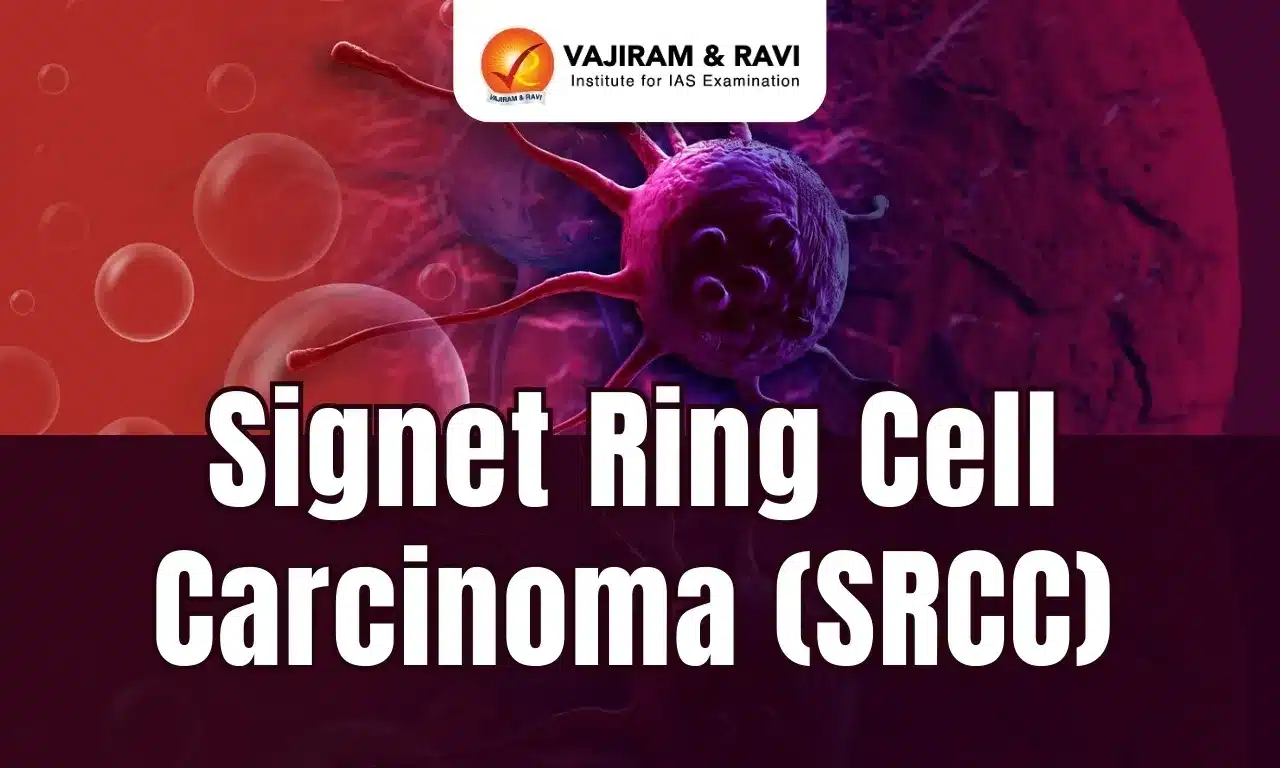Signet Ring Cell Carcinoma (SRCC) Latest News
Recently, a team of Indian scientists has developed novel analytical methods to study and potentially treat Rare Colorectal Cancer (SRCC) more effectively.
What is Signet Ring Cell Carcinoma (SRCC)?
- Signet Ring Cell Carcinoma (SRCC) is a rare and aggressive subtype of colorectal cancer (CRC) that originates in the colon or rectum.
- It is named for the signet ring-like appearance of its cells under a microscope, caused by mucus pushing the nucleus to one side.
- SRCC is known for its rapid spread, resistance to conventional therapies, and late-stage diagnosis, making it one of the deadliest colon cancer variants.
What Are the Innovative Methods Introduced?
- The researchers developed Patient-Derived Organoids (PDOs) and Patient-Derived Xenografts (PDXs):
- PDOs are miniature 3D tumour models grown from human cancer tissues in lab dishes.
- PDXs involve implanting human tumour cells into mice, enabling the tumour to grow in a living system.
- These lab-grown models closely mimic the molecular behaviour of actual human SRCC tumours.
- This method forms one of the first living biobanks of SRCC models, enabling researchers to study the disease more precisely and test treatments in a controlled environment.
- A major difficulty in treating SRCC is its tendency to spread to the peritoneum, the lining of the abdominal cavity, which worsens the prognosis and reduces treatment effectiveness.
- While SRCC makes up only 1% of all CRC cases globally, in India, it affects a disproportionately larger number of patients — nearly 10 times more, often in younger individuals.
Signet Ring Cell Carcinoma (SRCC) FAQs
Q1. What is Signet Ring Cell Carcinoma (SRCC)?
Ans. SRCC is an aggressive cancer subtype marked by cells resembling signet rings (cytoplasm pushed to periphery by mucin). It commonly affects the stomach, colon, or breast.
Q2. Why is SRCC clinically significant?
Ans. It has a poor prognosis due to late diagnosis, rapid metastasis, and resistance to chemotherapy. Early detection via endoscopy/biopsy is critical.
Q3. What are the risk factors for SRCC?
Ans. Genetic predisposition (CDH1 mutations), chronic inflammation (e.g., H. pylori infection), and lifestyle factors like smoking.
Source: IE
Last updated on June, 2025
→ UPSC Notification 2025 was released on 22nd January 2025.
→ UPSC Prelims Result 2025 is out now for the CSE held on 25 May 2025.
→ UPSC Prelims Question Paper 2025 and Unofficial Prelims Answer Key 2025 are available now.
→ UPSC Calendar 2026 is released on 15th May, 2025.
→ The UPSC Vacancy 2025 were released 1129, out of which 979 were for UPSC CSE and remaining 150 are for UPSC IFoS.
→ UPSC Mains 2025 will be conducted on 22nd August 2025.
→ UPSC Prelims 2026 will be conducted on 24th May, 2026 & UPSC Mains 2026 will be conducted on 21st August 2026.
→ The UPSC Selection Process is of 3 stages-Prelims, Mains and Interview.
→ UPSC Result 2024 is released with latest UPSC Marksheet 2024. Check Now!
→ UPSC Toppers List 2024 is released now. Shakti Dubey is UPSC AIR 1 2024 Topper.
→ Also check Best IAS Coaching in Delhi






















